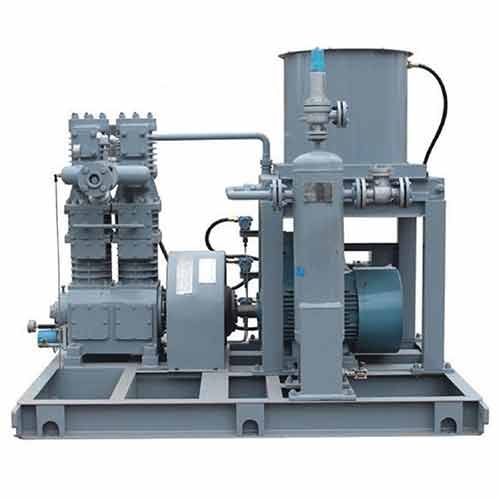The Wonders of LNG Compressor: Energizing the Energy of the Future
What does an LNG compressor mean?
A specific kind of compressor called an LNG compressor is used in the liquefied natural gas sector to manage natural gas compression at various points in the LNG production, shipping, and distribution process. Gases can be made more suited for storage, transit, and various other uses by using compressors, which are mechanical machines.
The Production of LNG:
There are various phases involved in the production of LNG:
- Drilling is used to recover natural gas from subsurface sources.
- Heavy hydrocarbons, sulfur compounds, and water impurities are eliminated.
- LNG is produced when the purified natural gas is cooled to its liquefaction point.
- LNG is carried in specially constructed LNG carriers and is stored in specialized cryogenic tanks.
Benefits and Significance:
LNG is a fossil fuel that burns cleaner than coal and oil, releasing fewer greenhouse gases and other pollutants.
- Access to various energy sources through LNG allows for a reduction in reliance on a single energy source and an increase in energy security.
- The ability to transport natural gas across seas thanks to the liquefaction process has led to the developing of a global market for this fuel.
- LNG may generate energy, heat buildings, power industrial operations, and fuel cars and ships.
- Due to its reduced emissions profile, LNG is frequently seen as a transitional fuel toward renewable energy sources.
The LNG Compressors’ Marvels: Energizing the Energy of the Future
The production, transportation, and distribution of liquefied natural gas (LNG) are all made possible by LNG compressors, which are essential parts of the LNG business. This strong equipment is in charge of preserving the flow and pressure of LNG across the whole supply chain. LNG compressors serve a variety of purposes throughout the LNG value chain, including:
- Liquefaction:
Natural gas is cooled during the liquefaction process, which produces LNG. Before the gas enters the cryogenic chilling process, compressors pressurize it. This helps the gas reach the required temperature for liquefaction.
- Transportation:
LNG is delivered in specially made LNG carriers once it has been liquefied. LNG must be maintained at particular pressures to maintain its liquid condition while being transported. These carriers’ compressors aid in maintaining the necessary pressure levels.
- Regasification:
LNG is heated at the receiving terminal to undergo regasification, which returns it to a gaseous state for distribution. To pressurize the regasified gas for distribution into pipes, compressors are used.
- Distribution and End Use:
Compressors are used in distribution and end-use applications to raise the pressure of natural gas for various uses, including power production, industrial activities, and domestic heating.
What advantages does the HUAYAN LNG compressor offer?
The effectiveness, dependability, and general success of the liquefied natural gas (LNG) sector are all facilitated by the numerous advantages that LNG compressor provides. The following are some major benefits of LNG compressors:
- Effective Liquefaction and Transportation:
In the liquefaction process, LNG compressors are essential because they assist in raising natural gas pressure before it enters the cryogenic chilling phase. This makes it possible for the gas to get to the low temperature needed for liquefaction. Similarly, compressors keep the pressure within LNG carriers at a certain level throughout transportation, ensuring that the LNG keeps its liquid state—a need for safe and effective transportation.
- Reliable Gas Regasification:
Before distribution, LNG must be regasified at the receiving terminal. The pressurization of the regasified gas by compressors prepares it for distribution through pipes. Consistent gas pressure is ensured through dependable compressor operation, essential for effective and trustworthy delivery to end customers.
- Flexibility and Capacity Adjustments:
Various LNG sector applications call for various pressure and capacity levels. Particularly reciprocating and centrifugal compressors provide flexible output adjustment in response to demand. This versatility aids in the distribution networks and LNG plants operating as efficiently as possible.

- Energy Efficiency:
Modern LNG compressor is built with great efficiency in mind, consuming the least amount of energy possible while compressing and transporting the gas. In addition to lowering operating expenses, this efficiency supports the sector’s initiatives to lower greenhouse gas emissions and enhance environmental performance.
- Safety and Reliability:
To withstand cryogenic temperatures and high-pressure situations, LNG compressors are manufactured to exact safety requirements. The safe handling of LNG at all phases, from production to distribution, is ensured by its dependable functioning. Integrated safety measures, including pressure relief valves and automatic shutdown mechanisms, improve LNG facilities’ overall safety.
Types of LNG Compressors:
The LNG sector uses a variety of compressor types, including:
- Reciprocating Compressors:
These compressors compress the gas using pistons. They are renowned for being extremely effective and adaptable, making them suited for various pressure and capacity needs.
- Screw Compressors:
Screw compressors compress gas using helical rotors that mesh together. They operate well and nicely under constant use.
HUAYAN LNG compressor’s importance will only increase with the development of the energy sector:
- Shift Fuel:
Because LNG emits fewer pollutants than other fuels, it may be used as a bridge fuel as the world shifts to greener energy sources. As LNG moves through its lifespan, compressors make handling it effective.
- Energy Demand:
LNG will be used to fulfill the increasing energy demand, particularly in emerging nations, and compressors will continue to be a crucial part of the LNG infrastructure.
- Hydrogen Economy:
In the coming hydrogen economy, where hydrogen is compressed and transported similarly to LNG, compressors are anticipated to find use in several industries.
Conclusion:
The LNG industry relies heavily on LNG compressor, which has various advantages, including dependable gas regasification, effective liquefaction and transportation, energy efficiency, safety, and environmental advantages. We are positioned to play a significant role in energy development because of our adaptability, diversity, and interaction with digital technology. The HUAYAN constantly upholds the quality policy of full involvement, excellence, customer happiness, and ongoing improvement in production and operation.
